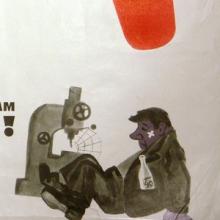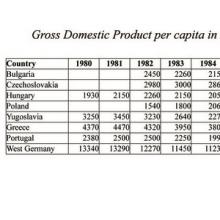Government
Short Teaching Module: Memory in East Germany
This case study examines how a group of East German dissidents re-appropriated the memory of Rosa Luxemburg and turned her writing against the Communist Party during an annual parade in January 1988.
Short Teaching Module: Reagan at the Brandenburg Gate
In June 1987, President Reagan delivered an important speech in front of the Brandenburg Gate in West Berlin. This case study looks at how to use the speech as a means to examine US foreign policy and the end of the Cold War.
Short Teaching Module: Women in Romania
Using oral histories, this case study explores various aspects of women’s daily lives in Communist Romania and women’s attitudes toward the changes wrought by the transformation to a pluralist system and to a market economy after the collapse of the regime in December 1989.

Short Teaching Module: Soviet Health Posters
This case study examines two posters that address the increasingly embarrassing and difficult health crisis of the Soviet Union in the 1970s and 1980s.
Activity: Simulating the Velvet Revolution
This case study simulates the process of the extraordinarily quick (and often peaceful) overthrow of various communist regimes is Eastern Europe in 1989. The simulation provides a powerful experiential study of how dissent can quickly cascade through a group, leading to fast, dramatic change.
Long Teaching Module: Solidarity Comes to Power in Poland, 1989
In retrospect, it seems predictable that the first opposition group in the Soviet bloc to succeed in unseating a communist regime would be Poland’s Solidarity movement.

Mexico: From Empire to Revolution
By making hundreds of photographs available and placing them in a clear, historical context, the website provides students with a fascinating perspective on several crucial decades in Mexican history.
Long Teaching Module: Economies in Transition in Eastern Europe, 1970-1990
It is well known that the East European Communist governments were unable to provide their citizens with a standard of living comparable to that of the West.
Warsaw Embassy Cable, Bronislaw Geremek Explains Next Steps Toward a Solidarity Government
Following the historic semi-free elections in Poland in June 1989, which resulted in a near total defeat of the Communist regime, Polish Communist and Solidarity leaders engaged in ongoing and significant negotiations in the hope of establishing stability in Poland.
Czechoslovak Secret Police Memorandum, "Information Regarding the Situation in the CSSR"
As a result of the intensifying public demonstrations in the first half of 1989, the Czechoslovak Communist Party increased its surveillance and suppression of independent and opposition groups, particularly in anticipation of politically-charged anniversaries.